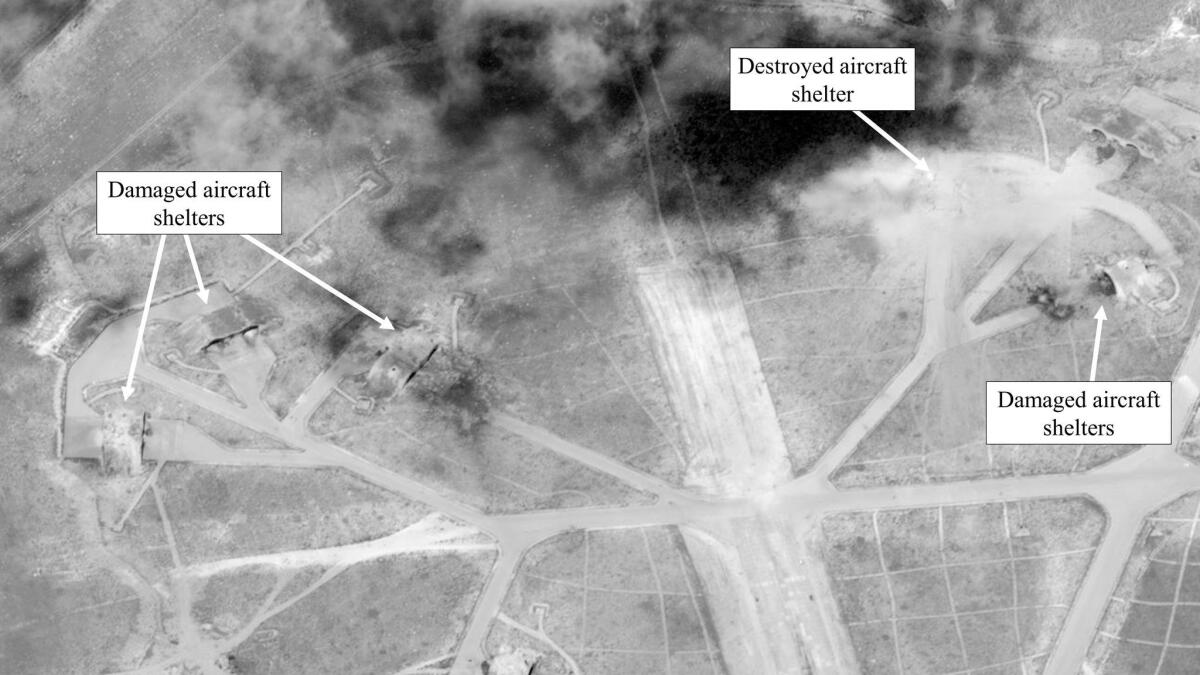Editorial: Trump told Obama not to attack Syria; now he does just that

- Share via
Donald Trump, who as a private citizen warned President Obama in 2013 not to launch an attack on Syria, did just that on Thursday and for the same reasons that his predecessor contemplated doing so — to punish the regime of Bashar Assad for using chemical weapons against his own people.
Whether the attack on a Syrian airfield will cause Assad to desist in the use of such weapons is unclear. Trump also failed to articulate any new strategy for ending the civil war in Syria, vaguely calling on “all civilized nations to join us in seeking to end the slaughter and bloodshed” in that country.
But this much is true: The chemical attack that left more than 70 people dead and hundreds more sickened was a gruesome and egregious violation of international norms — yet another outrage from a brutal leader who has presided over a six-year civil war that has led to the death of hundreds of thousands of Syrians.
In a brief address to the nation, Trump spoke with emotion about the dozens of Syrians killed this week in Idlib province apparently by sarin gas mixed with chlorine. “Even beautiful babies were cruelly murdered in this very barbaric attack,” the president said. “No child of God should ever suffer such horror.”
An impulsive, emotional reaction is not a good way to make a decision about the use of force. And rarely has an American president seemed more inclined to impulsive responses than this one. But Trump was right when he said: “It is in the vital national security interest of the United States to prevent and deter the spread and use of deadly chemical weapons.”
That statement echoes former President Obama’s explanation four years ago for why he planned military action — strikingly similar to the action Trump took on Thursday — to punish Assad for crossing the “red line” of using chemical weapons against his people.
Obama never carried through with that threat, partly because of resistance in Congress, but also because Russia induced Assad to agree to the internationally supervised destruction of Syria’s chemical weapons stockpile. That diplomatic solution seemed to offer a way to solve the problem without resorting to military force.
Now, of course, it seems clear that Assad didn’t comply completely with that commitment, with horrible results for innocent Syrians. That provides a justification for the action taken by the Trump administration, which, like the Obama administration before it, has been careful not to portray its military action as an attempt at regime change.
Meanwhile, the more important and far more difficult question is what the new administration’s strategy will be in Syria. Trump has repeatedly promised to reduce U.S. involvement in overseas conflicts and promote an “America First” agenda instead. What’s more, he has hinted that he believes Assad ought to remain in power, at least for the time being, and that the U.S. should expend its resources fighting the radicals of Islamic State. But now, only 11 weeks into his term, he’s already being dragged in, forced to face realities and complexities he had apparently not anticipated.
Back in February, Trump learned suddenly that rewriting the healthcare laws was “complicated.” Now he’s learning the same about foreign policy. Let’s hope he can find a strategy more effective than his predecessor’s to help bring this brutal war to an end.
Follow the Opinion section on Twitter @latimesopinionand Facebook
MORE FROM OPINION
My phone was searched at LAX, which apparently is the new normal
Congress didn’t just nuke the filibuster, it permanently politicized the Supreme Court
More to Read
A cure for the common opinion
Get thought-provoking perspectives with our weekly newsletter.
You may occasionally receive promotional content from the Los Angeles Times.






